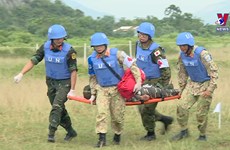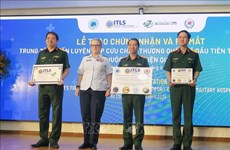Vietnam sees high rate of thalassemia patients
An estimated 20,000 Vietnamese people are living with thalassemia and
require treatment, as heard workshop in Hanoi on May 5.
An estimated 20,000 Vietnamese people are living with thalassemia and
require treatment, as heard workshop in Hanoi on May 5.
Thalassemia is a form of anaemia, a genetic blood disease a child can inherit if one or both of his/her parents carry the disease genre; the risk is higher if both parents have the disease. The disease is not always symptomatic, but can be identified through testing.
The workshop was co-hosted by the National Institute of Haematology and Blood Transfusion and the Vietnam Thalassemia Association in response to International Thalassemia Day (May 8), aiming to raising public awareness of the disease and prevention methods.
Reports presented at the workshop showed about 7 percent of the world population carry the thalassemia genre. Vietnam is high risk of the disease with an estimated 10 million people carrying the genre.
Experts from the institute said basic treatment methods are blood transfusions and iron elimination.
Professor Nguyen Anh Tri, Director of the institute, shared that thalassemia is a social issue that can seriously impact the economy and the quality of life of a population.
He stressed the need to carry out the National Thalassemia Programme to reduce the number of children born with the disease.
On the occasion, a number of practical activities to support thalassemia patients will be arranged nationwide.-VNA
Thalassemia is a form of anaemia, a genetic blood disease a child can inherit if one or both of his/her parents carry the disease genre; the risk is higher if both parents have the disease. The disease is not always symptomatic, but can be identified through testing.
The workshop was co-hosted by the National Institute of Haematology and Blood Transfusion and the Vietnam Thalassemia Association in response to International Thalassemia Day (May 8), aiming to raising public awareness of the disease and prevention methods.
Reports presented at the workshop showed about 7 percent of the world population carry the thalassemia genre. Vietnam is high risk of the disease with an estimated 10 million people carrying the genre.
Experts from the institute said basic treatment methods are blood transfusions and iron elimination.
Professor Nguyen Anh Tri, Director of the institute, shared that thalassemia is a social issue that can seriously impact the economy and the quality of life of a population.
He stressed the need to carry out the National Thalassemia Programme to reduce the number of children born with the disease.
On the occasion, a number of practical activities to support thalassemia patients will be arranged nationwide.-VNA













